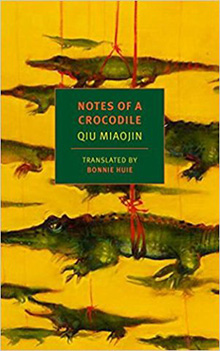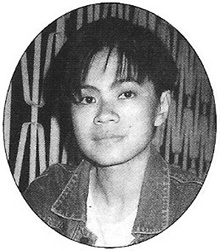 Notes of a Crocodile
Notes of a Crocodile
by Qiu Miaojin
Translated by Bonnie Huie
Published by NYRB Classics
Published May 2, 2017
Fiction (lesbian / foreign)
256 pgs. • Find on Amazon.com
Reviewed by Stephen O. Murray
May 23, 2017
Reading the supposed “cult classic” Notes of a Crocodile (Eyu shouji, 1994), it is difficult to forget for even a moment that the author, Qiu Miaojin, committed suicide in 1995 less than a month after her 26th birthday.
If the book had any value as testimony to what it was like to be young just after the end of nearly four decades of martial law on Taiwan or as documentation of the lesbian subculture that was emerging, particularly at her school, the elite Taiwan National University (TaiDa), it might be possible to overlook the awkwardness of the composition and the dreariness of the author’s/narrator’s self-hatred and self-laceration. Obviously, I don’t think it does… and I don’t have to concern myself with hurting the feelings of a vulnerable young author.
So, I can say that I found the book boring, sophomoric in the worst senses, and unbearably self-pitying. One biographical fact that scares me is that Qiu was a therapist for a while (then went to do graduate work in psychology in Paris). The narrator—in eight notebooks that may have derived from diaries, but which do not even pretend to be comprised of entries made at specific times during her four years at TaiDa—recalls her suffering as a woman attracted to women but mostly unable to have sexual relations with one.

As a freshman, Lazi was smitten by Shui Ling, a student a year ahead of her. Though it eventually becomes clear that Shui Ling’s sexual orientation was also to women, Lazi never even tried to bed her. Although detailing nothing about it, Lazi eventually had sex with a still older woman, Xiao Fan. She says she has beautiful memories of Xiao Fan, “the only woman I ever made love to,” but also that “I can’t conceivably depict this woman” and that she “never really knew this woman’s heart.” I don’t know why Lazi could not fill in details on her beautiful memories.
In addition to the unrequited infatuation with Shui Ling, Lazi fell in with an agonized gay male couple, the sweet, stolid and handsome Chu Kuang and the punk Mephistopheles, Meng Sheng, with whom Lazi tries sex with a man some years after first meeting him. She categorized him as “an archetypaly beautiful boy [who] had the power to lead others astray.” There is also a pair of lesbian lovers who cannot stay together, Tun Tun and Zhi Rou:
I liked them as individuals. I liked them even more when they were together. Were I a collector of figurines, these two would be my most prized pair.
The book is not entirely solipsistic, though there is a strong solipsistic undertow throughout it. And “figurines” is a telling locution for beings who do not really live within Lazi’s self-lacerating memoir. “I had needs like anyone else,” she wrote:
…and, sure, one of those needs was a little acknowledgment. But the problem was the way I loved: It was the very cause of my pain, [but also] I’d succeeded in fleeing from all the desires and fears that come with having someone special in my life.
Earlier, she recalled that “I’d been keeping my deviant sexual desires in check for most of my adolescent and college years,” though Shui Ling “accepted me, which amounted to negating my negation of myself.”
On the first page of the book there are allusions to three Japanese writers, two of them, Dazai Osamu and Mishima Yukio, suicides. The third, still very much living Mirakami Haruki, recurs later, along with paragraphs about two Kobo Abe novels. There are mentions of Jean Genet, André Gide, The Great Gatsby, García Marquez’s Chronicle of a Death Foretold, and Derek Jarman (and nausea induced by “Betty Blue”), but no references to any Taiwanese or Chinese writers or filmmakers.
There are also a lot of references to streets in Taipei and the 74 busline, but no detailing of “local color,” of the sights, sounds, smells of Taipei (contrast Ed Lin night-market mysteries), nor any indication of ethnic diversity in Taiwan or the opening up of the culture after the end of martial law. I don’t think there is anything distinctively Taiwanese (or Chinese) about the feelings of isolation and the need to hide homosexual desires or about the frustration of breaking out to connect with a partner in this document/novel.
Oh, yes, I nearly neglected to mention the fantasy of being a crocodile disguised as a human that also goes nowhere. It is intrigued to learn that there may be other crocodiles and that there is much public interest in them (as there was public interest in (and misinformation about) lesbians in Taiwan during the early 1990s).
I am sorry that Qiu Miaojin hated herself and killed herself at a young age. There are certainly portends of suicide throughout Notes of a Crocodile. But I found nothing worth the time and effort of wading through the adolescent posing as a martyr to “deviant” desire and no cultural specificity in the book. That is, I don’t agree with Lazi/Qiu that there was any need to “leave behind some sort of record before my memories evaporated.”
This book is the only one published by NYRB that I’ve seen that is without an introduction or an afterword. In lieu of that, there is an online piece by translator Bonnie Huie at https://pen.org/on-translating-qiu-miaojin/. She claims that “because it is a novel about process, part of its beauty comes from failure. As a reader, you must accept that any tragic conclusion, with its intrinsic properties of ambivalence, is already an improvement.”
Must I? I don’t!
©2017, Stephen O. Murray

